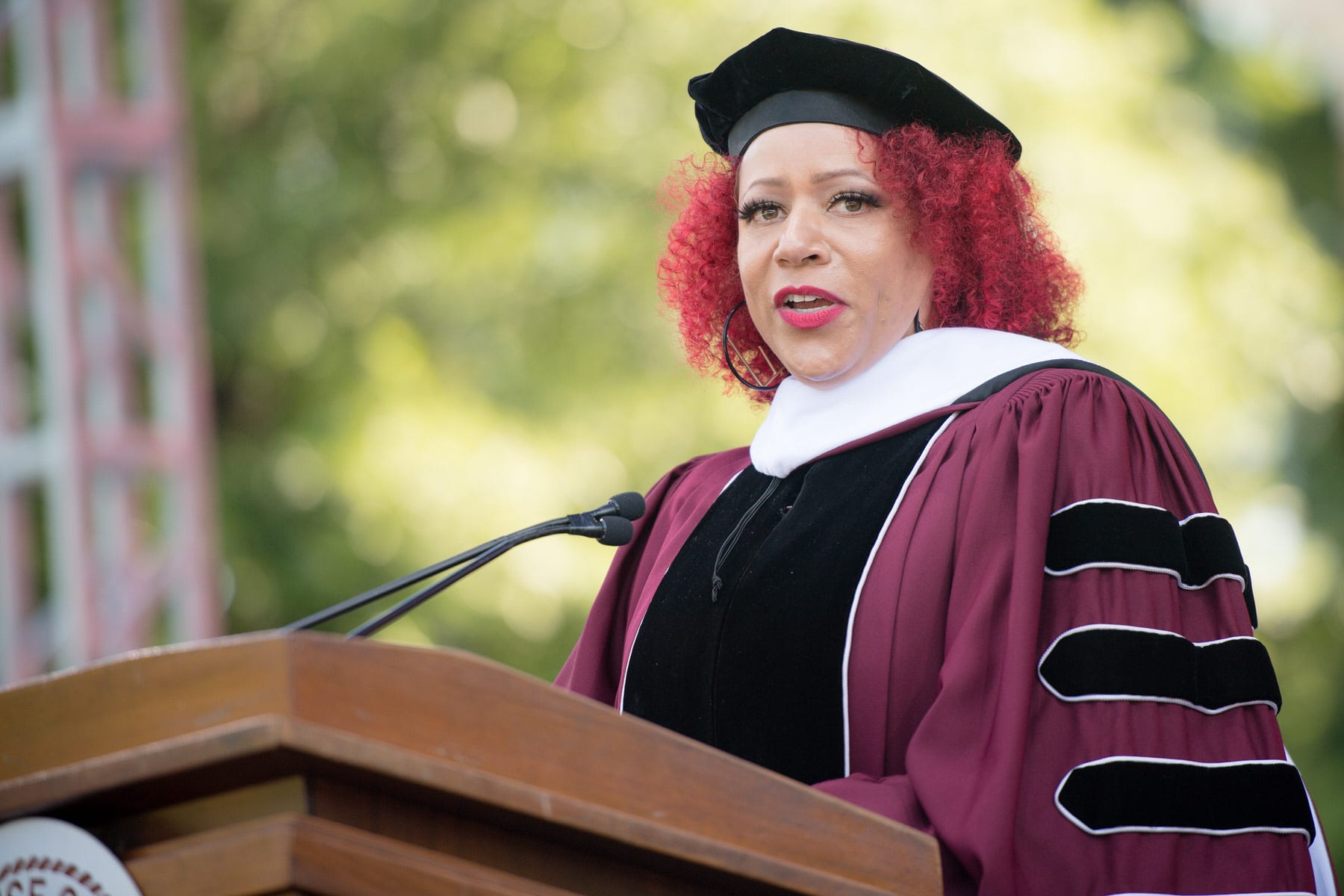Read the latest story: UNC board to reexamine tenure for Nikole Hannah-Jones
Nikole Hannah-Jones, a Pulitzer Prize-winning investigative journalist and MacArthur Fellow, was set to teach in a position that has traditionally come with the expectation of tenure at her alma mater, the University of North Carolina at Chapel Hill in the Hussman School of Media and Journalism. But after pushback from conservatives, the board of trustees denied her tenure despite approval from faculty and the tenure committee, offering a five-year teaching contract instead.
The university had announced in April that Hannah-Jones, who received her master’s degree there in 2003, would become the newest Knight Chair — a professorship endowed by the John S. and James L. Knight Foundation — that has historically been a tenured position at the university. Hannah-Jones sparked ire from conservative leaders, including former President Donald Trump, after she won the Pulitzer Prize for commentary for the New York Times’ 1619 Project, which was published in 2019 and marked the 400th anniversary of the arrival of the first known enslaved Africans.
“My courses will examine the big questions about journalism,” Hannah-Jones said in a statement in April after her hiring was announced. “But they will also bring the practical experiences and advice of someone who covered daily beats, who had to fight to be in a position to do big projects, who can speak to the rigors of academic and accumulated knowledge, but also the practicalities of how you build a career, navigate the industry and deal with setbacks.”
Hannah-Jones declined to comment further when she was reached Wednesday evening.
The university, board of trustees and the legislature have been receiving letters and phone calls in support and opposition since the hire was announced, an unidentified board member, who chose to remain anonymous, told NC Policy Watch.
The board’s ultimate decision to offer Hannah-Jones a five-year contract stunned faculty. More than two dozen faculty members signed a letter that demanded “explanations from the university’s leadership at all levels” and called for her tenure.
“This failure is especially disheartening because it occurred despite the support for Hannah-Jones’s appointment as a full professor with tenure by the Hussman Dean, Hussman faculty, and university,” according to the letter, which was published on Wednesday. “Hannah-Jones’s 20-plus year distinguished record in the field of journalism surpasses expectations for a tenured position.”
Mimi Chapman, the university’s elected faculty chairperson, addressed the board of trustees during a committee meeting on Wednesday and outlined the “exhaustive process” that is undertaken when making tenure recommendations.
First, she said, about four to six letters are solicited from faculty members at other universities who have spent hours and hours reviewing the candidate’s file. Next, every full professor in the given department reviews the candidate’s file. Then, the file goes to a 12-member elected committee that meets monthly where it is reviewed again. At that point, a final recommendation is made to the provost. In total, at least 164 hours of faculty time go into any tenure decision, Chapman said.
Though the board has the authority to deny a tenure recommendation, Chapman asserted that that power should only be used in extreme situations, such as when a professor commits a crime.
“To take this decision is to say to the faculty, intentionally or not, that our expertise, our judgment, our devotion to this institution and indeed our time is not something that you value,” Chapman said. “And to receive this message after a year like we have all had — in which we have gone to extraordinary lengths to respond to student needs, keep our research going, keep our own families healthy and whole — is devastating and demoralizing.”
Hannah-Jones’s 1619 Project — which includes audio, essays, poems, graphics and visual art pieces — reframes the history of the U.S. through the legacy of slavery and its ultimate influence on the country’s democracy. She has maintained extensive ties to the university, delivering the Hussman School’s commencement speech in 2017. The Ida B. Wells Society for Investigative Reporting, a national organization that she helped found to develop and retain journalists of color, is based at Hussman as well.
Republican lawmakers in several states filed bills that would cut funding to educational institutions that provide lessons derived from the project. Despite strong reservations about the project from some historians, who cite inaccuracies and misleading statements, the Times has defended the project and its aim to “reframe the country’s history” by placing the consequences of slavery at the center of the narrative.
Alberto Ibargüen, president of the Knight Foundation, said there has been a Knight Chair in Journalism at the university since 1984, when it was a professorship to teach advertising. The position has since been converted to teach digital advertising and marketing and now race and investigative reporting. Each change is proposed by the university and agreed to by the foundation, which respects the “academic independence” of partnering schools, he said.
“It is not our place to tell UNC or UNC/Hussman who they should appoint or give tenure to,” Ibargüen said. “It is, however, clear to us that Hannah-Jones is eminently qualified for the appointment and would urge the trustees of the University of North Carolina to reconsider their decision within the timeframe of our agreement.”
Susan King, the dean of the Hussman School of Journalism, said though she is “disappointed that the appointment is without tenure,” the faculty and staff are delighted to welcome Hannah-Jones — “arguably the preeminent journalist of her generation” — to their ranks in the fall.
“I can only imagine how our students will benefit from her wisdom and experience,” King said. “We are happy to bring her back to the university she loves.”





